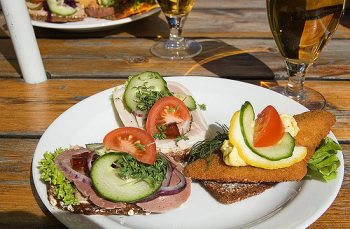5 Senses in Danish Posted by Bjørn A. Bojesen on Oct 24, 2017 in Vocabulary
In order to learn Danish you need to keep both ører (ears) and øjne (eyes) open. To get the full cultural oplevelse (experience), however, you have to engage alle dine fem sanser (all your five senses).
Høresans (sense of hearing) or hørelse [hur-l-seh]. Hører du hvad jeg siger? [hur do va yi seeor] (Do you hear what I’m saying?) Unless you’re døv (deaf) or hørehæmmet (having a bad sense of hearing), my best guess would be that each øre of yours is perfectly fine. You can continue reading without høreapparat (hearing aid). Lyt lige her… (Listen up now…)
Synssans (sense of syn [seen] – sight). People who aren’t blind [blinn] use øjnene to se [seh] (see). Some need the help of briller (glasses), kontaktlinser (contact lenses) – or a kikkert (pair of binoculars). Hvad kigger du på? (What are you looking at?)
Lugtesans (sense of smell). One of the worst things about at være forkølet (having a cold) is the nedsat lugtesans (reduced sense of smell) you get. Næsen vil gerne lugte alle verdens lugte og dufte. (The nose wants to smell all the world’s smells and scents – well, most of them! 🙂 ) BTW, many Danes associate the verb at lugte (to smell) with negative smells like prutter (farts), and prefer to use the verb at dufte in positive phrases like roserne dufter fantastisk i dag (≈ ”the roses are really emitting a fantastic odour today”).
Smagssans (sense of taste). Tunge/n (the tongue) isn’t only useful when having fun with tongue twisters, but also in alien encounters with yummy Danish mad (food). Smager retten sødt, surt, salt, bittert – eller som kylling? (Does the dish taste sweet, sour, salty, bitter – or like chicken?)
Følesans (sense of touch). All the Danes who have been grooving in støvregn [sturwryen] (drizzle, literally ”dusty rain”) in front of Orange Scene at the Roskilde Festival know how great it can be to mærke (sense, feel) regndråberne (the raindrops) against your face. It’s also nice to føle (feel) sommervarmen (the summer warmth) and the comfort of a kram (hug).

Build vocabulary, practice pronunciation, and more with Transparent Language Online. Available anytime, anywhere, on any device.




